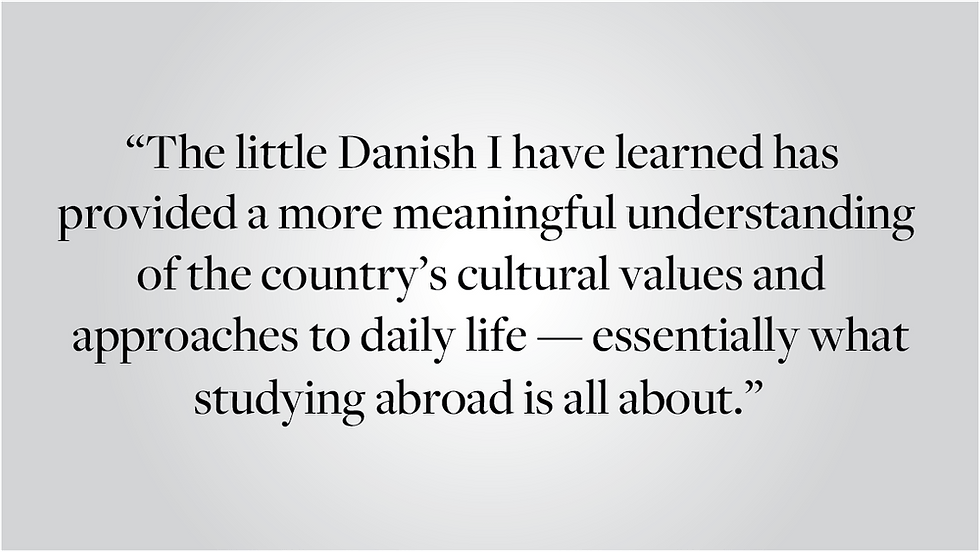
The first thing I noticed about the woman behind the counter at Copenhagen’s Immigration Services was her Bruce Springsteen graphic tee. “I like your shirt,” I said as I handed over my passport. She looked me directly in the eye: “He is the love of my life.” We sat with this for a moment. Then, she rolled her sleeve up to the collarbone to reveal a tattoo: the words “BORN TO RUN” in English inked underneath a silhouette of Bruce’s iconic pose from the album cover. “You love him too?” she asked. When I responded yes, she nodded, pleased, and passed me the documentation that gives me access to things like free healthcare in the country I live in now.
Since arriving in Denmark three weeks ago, I have often reflected on the fact that I can have memorable interactions like this one because I chose to study abroad in a country where 86% of the population speaks English. Not only could I speak with the woman at Immigration Services, but we also found connection through a shared appreciation for the poetry of “The Boss.” Despite my mandatory enrollment in Danish Language and Culture I, it would be incredibly easy to live in Denmark for an entire semester without gaining an ounce of facility over the language. In fact, the highest barriers to communication I’ve encountered thus far have all been pastry-related. But the little Danish I have learned has provided me with a more meaningful understanding of the country’s cultural values and approaches to daily life — essentially what studying abroad is all about.
Take what is perhaps the trendiest Danish word of recent years, “hygge,” which refers to the warmth and coziness of connecting with other people. A 2016 finalist for Oxford Dictionary’s word of the year, “hygge” has blown up online as a self-care-adjacent lifestyle trend. Scroll through #hygge on TikTok to find thousands of videos of vintage interior decor or a teen’s skincare haul. There are dozens of touristy shops in downtown Copenhagen that turn the immaterial concept of “hygge” into a brand. Encountering the overwhelming commodification of “hygge” at first feels like stumbling upon yet another social media grift that capitalizes upon consumers’ perpetual dissatisfaction with their own lives — a phenomenon explored in a recent Herald column by Sarah McGrath ’24 — but “hygge” reflects important social values of collectivity. Its core elements of interpersonal connection, domestic contentment and trust are pillars of a Danish lifestyle. Understanding “hygge” in Danish, therefore, means understanding Denmark.
Other recent linguistic trends also emphasize the social cohesion of Danish society. “Samfundssind,” a compound of “society” and “mind” that roughly translates to community spirit, was first used during World War II as a way of raising public morale but fell out of fashion — until current Prime Minister Mette Frederiksen revived the term in a press conference held at the beginning of the COVID-19 pandemic. In Danish media, “samfundssind” went from 23 mentions in February 2020 to 2,855 the next month. When Danish celebrity chef Rasmus Munk cooked meals for people experiencing homelessness during the pandemic, he said, “Denmark really came together, and I think ‘samfundssind’ was a big part of it.”
“Samfundssind” is not just a word but a way people organize themselves together in the world. Of course, it would be a mistake to view Danish society as faultless — Munk’s venture is only necessary because homelessness remains a persistent problem in Denmark — but these questions cannot be raised without first appreciating that language is a social process that influences how people interact with each other. I feel as if I live among people that see me as inherently deserving of their solidarity and sacrifice. Relationships with strangers that I previously believed to be nonexistent were just invisible.
Moving to another country means navigating not only a new place but a new history and a different approach to being alive. Language makes the abstract personal — it generates experiences, not just words. Both the woman who assigned me my social security number and I love Bruce Springsteen, but only she has the cultural knowledge to seriously imagine music reviewer Henrik Friis’s description of his 2012 Roskilde concert, one of Springsteen’s largest ever, as “an intimate atmosphere in the Danish style: friendly, relaxed people in such a positive community event … it was all ‘hyggeligt.’”
I’ve decided to give learning Danish a sincere try, not because I expect myself to gain anything resembling fluency, but because language itself can be a means of travel — a mode through which we experience a culture and a people and perhaps encounter a generosity of spirit, a “samfundssind,” that includes us as one of them.
Why learning about culture is important?
